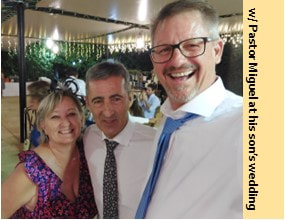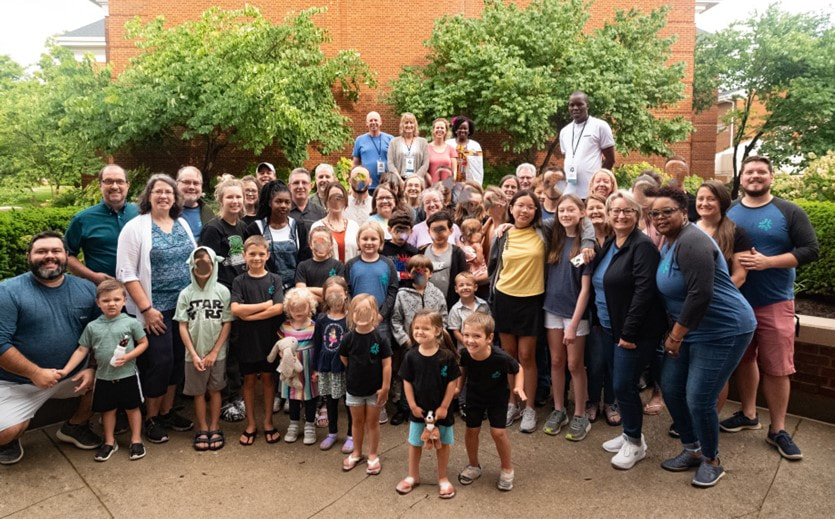 Several years ago, I began reading a series of detective mysteries by Louise Penny. The main character is Inspector Armand Gamache, an older, experienced police detective who is nearing the end of his career and is spending his final years mentoring newer, younger detectives. These are what we call his “legacy years” – the final few years of his career when he is still working, but also leaning heavily into imparting his wisdom and training up the next generation. I was particularly struck by Gamache’s “four statements” lesson. He says there are four things that lead to wisdom - four statements that you need to learn to say and to mean. I don’t know. I need help. I was wrong. I’m sorry. Billy and I were listening to a podcast this morning and the podcasters quoted these four statements. The hosts were discussing what it takes to build character, and they referenced the statements from Gamache as integral skills to showing maturity in character. As Billy and I were listening and talking through this, we reflected on our lives and work as cross-cultural workers. The ability to lean into these statements is in direct correlation to a CCW’s ability to be a humble learner in another culture. We are now entering our legacy years, the final 10 or so years when we are leaning heavily into training others, mentoring, coaching the next generation of cross-cultural workers, and focusing on leadership development. One of the biggest values that we want to see in CCWs is that they are humble learners – that they can enter a culture or a relationship with humility and with the posture of a learner. The ability to always see that there is something more to be learned in any given situation is critical, and the humility to admit that we are not the experts, we don’t have all the answers, and we have so much to discover and learn from others and their stories. The hard part is that we come from a culture that values knowledge, that rewards independence and a can-do attitude, and we are a culture that is accustomed to being the helper or the teacher, not the other way around. All of those are good qualities and they’re part of what makes America the powerhouse that it is in the world. But it’s also what associates America with power, and that sometimes hinders us from being able to build good relationships and go deep with people in other cultures. When we are seen as (or perceived as) always right or independent or people who have lots of knowledge and power, we are not seen as vulnerable or broken or in need of help or guidance. That attitude actually separates us from our neighbors. It also separates us from The Gospel. When we can be humble learners and more ‘real’ to our neighbors, we can begin to break down to perceptions and barriers. When I can feel free to make mistakes in my Spanish, I am showing my neighbors that I am not perfect. When I ask for help and admit that I don’t know how to do something, I’m showing that I don’t know everything (sometimes even the simplest things in this culture like how to pay a particular bill or cook a typical food). When I ask for help, I’m also honoring the other person with a statement of my own vulnerability and a statement of trust in their knowledge and ability to teach me. Perhaps the biggest one is the ability to say, “I’m sorry.” Sometimes we make mistakes. Sometimes our mistakes are hurtful. While I never intend to hurt anyone with my actions, sometimes my cultural ignorance gets in the way and I do, indeed, hurt someone. Saying “I’m sorry” is modeling a key component of the Gospel. Admitting that I did something that was hurtful is admitting my guilt or my sin, and asking for forgiveness is the obvious next step. When we model the process of admitting our faults and asking for forgiveness, we are living out a Kingdom principle in everyday life with our neighbors. The best place to start is practice. Practice saying these four statements. I promise, it won’t take long for a situation to arise in which you could say, “I need help” or “I don’t know”. I don’t think a day goes by when I don’t have cause to say, “I’m sorry” or “I was wrong” or “I don’t know” and “I need help”. In fact, I’m pretty sure that every single day holds reason to say at least some of these statements. Start with today. Keep your eyes and ears and heart open for the opportunity to practice one of these statements. I wonder where it might take you? I wonder how your relationships might be different if you start to practice using these?
0 Comments
 In July, we completed another training intensive for cross-cultural workers. This year, we held our 3-week training at Asbury Theological Seminary. TMS Global and Asbury have a long-standing partnership and it was a natural fit for us to work on the Asbury campus. (Some of you may recall the Asbury name from the recent awakening or revival that occurred on their campus earlier this year, bringing tens of thousands to their chapel from around the world and sparking renewed worship and service.) This year, I led a team of 12 facilitators with a shared experience of 150+ years living and serving as cross-cultural workers. Our facilitators have lived in Kazakhstan, Peru, Jordan, India, UAE, Spain, Kosovo, Liberia, and Kenya, and they have served in too many countries to name! With that depth of experience in various cultures comes a depth of stories and real-life connections that only our training can give. One of our trainees said, “It was a training like no other. I am leaving better than I was. This was an incredible time of learning and connection. When you get a room full of people who are passionate about Jesus, the transformation and learning comes naturally.” Our cross-cultural worker (CCW) trainees this year were also diverse. We hosted trainees from the USA, Kenya, North Africa, France and other places I cannot specifically mention for security reasons. Some of our trainees are already working in their places of service, while others are preparing to launch to fields in Asia, USA, East Africa, North Africa, and Europe. All of this diversity in the room also means there are various cultures, worldviews, languages, religious backgrounds, and values represented. This always makes for an amazing opportunity for learning and growing together! We have an intense curriculum that covers 75+ hours of sessions covering three threads: Cross-cultural ministry and skills, Spiritual Formation, Member Care / Personal Wellbeing. We incorporate daily scripture engagement and worship. One of the things that makes our program unique is the fact that alongside our adult training program, we run a program for children and families who will be serving cross-culturally. The children’s program follows the adult program topics in age-appropriate curriculum sessions. When adults are learning about Serving on Cross-cultural Teams or about Conflict Management and Resolution, the children’s sessions are also touching those same topics. A strong sense of community is a key factor in a comprehensive training program. While we are training individuals to go out and serve, we are also training people to live in community, to go out and be relational beings, as God created us, and to love their neighbors well. As we consider a strong training program, we also want to consider building a strong community of people who feel grounded and nurtured and supported, and who have the attitude of humble learners ready to learn from the community around them. “It was such a blessing to get a glimpse of the highs and lows of cross-cultural work. It’s a place where we formed community and a deeper understanding of God’s heart for us and for the nations,” said *Abraham. It is such a privilege and honor to have the opportunity to speak into the lives of cross-cultural workers serving around the world. “Humble learning was a very helpful concept to me. |
Laurie DrumIn my USA life, I was a teacher in Texas for 15 years. I was also a professional photographer, a soccer mom, a horsewoman, and the neighborhood hospitality queen. I did "Joanna Gaines farmhouse style" before Chip and JoJo were even a thing - we restored an 1884 Victorian farmhouse in small town Texas and did shiplap walls until I thought I'd go crazy. I taught at NASA, scuba dived with astronauts in training, and studied animals at Sea World for educational purposes. I've tried just about everything, because I have an insatiable need to know if I can do it! Never underestimate a Texas girl in cowboy boots! In 2006, my husband Billy and I became cross-cultural workers (CCWs) with TMS Global. For five years, we served in three rural Quechua Wanca villages in the Andes of Peru. And when I say rural, I mean RURAL - like no potty! I spent my days in Peru learning to live a Quechua lifestyle in a rustic adobe house - cooking Peruvian foods, sewing with Quechua women, raising my chickens and goats and pigs, and planting my gardens. Now I live my life in small town Spain, serving other cross-cultural workers via teaching and training and care, and helping displaced people to navigate their new reality in Europe.
I'm passionate about fostering personal growth, growth in community, and growth in The Kingdom. Walking alongside others and helping them to use their unique design, their gifts and strengths and maximize their abilities to fulfill their God-given purpose - that's what makes my heart sing! Archives
March 2024
Categories |
What We Do About Us Media Contact Us
Copyright © 2013 ~ Billy Drum, 4717 Shoal Creek Dr., College Station, TX 77845 ~ 979.985.5238

 RSS Feed
RSS Feed

